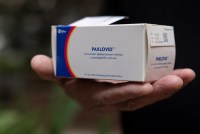Latest KFF Health News Stories
What Germany’s Coal Miners Can Teach America About Medical Debt
Coal mining ended in Germany’s Saarland a decade ago, but the transition away from coal has been smoother than in West Virginia, which has more medical debt than any state in America.
States Challenge Biden to Lower Drug Prices by Allowing Imports From Canada
Colorado has joined Florida, New Hampshire, and New Mexico in seeking federal permission to import prescription drugs from Canada. President Joe Biden endorsed the approach in his 2020 campaign but has yet to approve any state plan.
How Medicare Advantage Plans Dodged Auditors and Overcharged Taxpayers by Millions
Facing rare scrutiny from federal auditors, some Medicare Advantage health plans failed to produce any records to justify their payments, government records show. The audits revealed millions of dollars in overcharges to Medicare over three years.
Are You an Optimist? Could You Learn to Be? Your Health May Depend on It.
Multiple studies show a strong association between higher levels of optimism and healthy aging. We ask some dedicated optimists what might explain the connection.
KHN Investigation: The System Feds Rely On to Stop Repeat Health Fraud Is Broken
A months-long KHN examination of the system meant to bar fraudsters from Medicaid, Medicare, and other federal health programs found gaping holes and expansive gray areas through which banned individuals slip to repeatedly bilk taxpayer-funded programs.
In Rural America, Deadly Costs of Opioids Outweigh the Dollars Tagged to Address Them
Some people say it’s reasonable for densely populated areas to receive more settlement funds, since they serve more of those affected. But others worry this overlooks rural communities disproportionately harmed by opioid addiction.
Journalists Explain Medicaid Work Requirements and Hospital Price Transparency
KHN and California Healthline staff made the rounds on national and local media this week to discuss their stories. Here’s a collection of their appearances.
Los hospitales optimizan los ingresos tratando de mantener sus camas llenas al 100 %, y llenas de pacientes con condiciones que las aseguradoras reembolsan bien.
Hospital Financial Decisions Play a Role in the Critical Shortage of Pediatric Beds for RSV Patients
Yes, the U.S. is experiencing an unusual spate of childhood RSV infections. But the critical shortage of hospital beds to treat ailing children stems from structural problems in pediatric care that have been brewing for years.
To Attract In-Home Caregivers, California Offers Paid Training — And Self-Care
Turnover ails a program that allows low-income people who are older or disabled to age in place. To attract new workers and improve retention, the state is paying caregivers to develop new skills.
‘An Arm and a Leg’: He Made a Video About Health Insurance Terminology That Went Viral
A video producer’s quest for health coverage led him to create a video about insurance terminology. That video now has over a million views. Here’s how he did it.
KHN’s ‘What the Health?’: Congress Races the Clock
Sen. Raphael Warnock’s re-election in Georgia will give Democrats a clear-cut Senate majority for the first time in nearly a decade. Meanwhile, the current Congress has only days left to tackle major unfinished business on the health agenda, including fending off scheduled pay cuts for doctors and other health providers in the Medicare program. Joanne Kenen of the Johns Hopkins Bloomberg School of Public Health and Politico, Anna Edney of Bloomberg News, and Sandhya Raman of CQ Roll Call join KHN’s Julie Rovner to discuss these topics and more. Plus, for extra credit, the panelists recommend their favorite health policy stories of the week they think you should read, too.
More States to Consider Extending Postpartum Medicaid Coverage Beyond Two Months
Fifteen states haven’t moved to extend Medicaid coverage for new moms beyond the minimum of 60 days after birth. But at least four of those holdout states — Montana, Wyoming, Missouri, and Mississippi — are expected to consider proposals to extend coverage in their upcoming legislative sessions.
For Patients With Sickle Cell Disease, Fertility Care Is About Reproductive Justice
The disease, which predominantly affects Black patients, can damage the body in ways that can make having a child difficult. But patients don’t always have access to fertility care.
A Family Death During the Holidays Prompts Questions and Reflection
The death of a sharp but frail patriarch just days before Thanksgiving casts a shadow on a family’s holiday season.
Colorado Option’s Big Test: Open Enrollment
Critics were ready to bury the state’s new health insurance plans, based on a public option, when 2023 rate hikes were announced, but officials are confident people will be drawn to the plans’ benefits.
Paxlovid Has Been Free So Far. Next Year, Sticker Shock Awaits.
The government soon will stop paying for the covid drug that has proved to be the most effective at keeping patients alive and out of the hospital.
Watch: Big Medicaid Changes in California Leave Millions of Patients Behind
KHN senior correspondent Angela Hart discusses how California’s big Medicaid experiment to bring social services to the sickest and costliest patients doesn’t help most patients.
Florida Leaders Misrepresented Research Before Ban on Gender-Affirming Care
The Florida policy backed by Gov. Ron DeSantis relies on one key statistic that many experts question.
Employers Use Patient Assistance Programs to Offset Their Own Costs
Some insurers and employers are tapping into assistance programs meant for individual patients. The concern: Some costly drugs could be harder for patients to access.

























